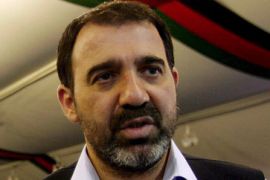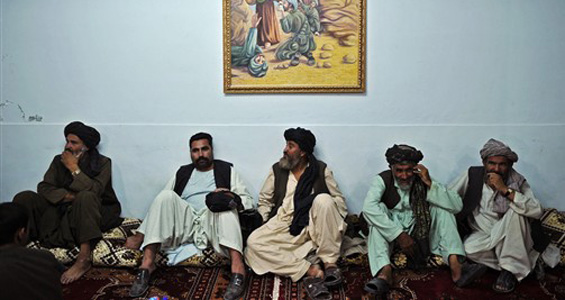The US and Karzai’s little brother
US should embrace Kandahar “strongman” Ahmed Wali Karzai, says Robert Grenier.

 |
| The US may soon have to rely on local leaders to fight an insurgency against the Taliban [AFP] |
It would seem that the Americans just do not know what to do about Ahmed Wali Karzai.
The younger half-brother of Hamid Karzai, the Afghan president, is the head of the provincial council of Kandahar province, and the unrivalled power-broker of what the Taliban used to call the “southern zone” of Afghanistan.
A legitimate tribal leader of the powerful Durrani Popalzai in his own right, Ahmed Wali has pervasive contacts and influence throughout the tribally dominated society of his region.
He is staunchly loyal to his older brother, and certainly no friend of the Taliban or, still less, of al-Qaeda.
| In video | ||
|
As one of the few people who can actually get things done in greater Kandahar, Afghanistan’s second-largest city, the traditional base of the Taliban and the scene of a looming US-led military push which some believe could determine the outcome of the current counter-insurgency struggle, one would think that the US government would be reinforcing its relationship with Ahmed Wali Karzai – particularly when Afghan-led local governance is seen as key to victory over the Taliban.
Indeed, some in the US government do support him – or at least manage to deal effectively with him.
To many of these mostly civilian officials, Ahmed Wali is an important partner capable of providing local means and assistance to help them realise their projects, even if he may profit personally in the bargain.
But the US relationship with the southern Pashtun strongman is far from simple, and often far from supportive.
Symbol of corruption
 |
| Ahmed Wali is loyal to his older sibling [AFP] |
The US military, in particular, sees Ahmed Wali as a symbol of all that they are trying to overcome in their efforts to build effective governance as a bulwark against Taliban influence.
To them, the younger Karzai is essentially a warlord, able to parlay his influence over the centres of power in Kabul to control the appointment of local officials, to allocate – or confiscate – land, and to profit through facilitation of, if not direct involvement in, the opium trade.
US military officers have tried to make the case to their superiors – and ultimately to President Karzai himself – that Ahmed Wali represents to the majority of Afghans the self-serving, corrupt and ineffective governance which undermines support for the Kabul government and thus reinforces the appeal of the Taliban.
Both Ahmed Wali’s supporters and detractors may be right.
The pervasive power and influence which makes the provincial council head such an effective partner in a tactical sense may make him a strategic liability for the regime as it attempts, with massive foreign assistance, to extend its influence in the Pashtun-controlled areas which are the natural constituency of the Taliban.
The great irony in this is that if President Karzai’s junior sibling stands justly accused of pervasive abuses of power, it is the very systems championed by the Americans – and particularly by the US military – which have enabled him.
A US creation
By concentrating political and economic power in Kabul in an attempt to build up the central institutions of a strong and coherent state, the Americans have made it possible for those with privileged relations at the seat of power – such as the president’s little brother – to leverage this influence to suit their own ends.
If not for US policy, the creation of an Ahmed Wali Karzai in the south would have been far more difficult.
Now, confronted with a local strongman largely of their own inadvertent making, the Americans would be far better advised to embrace him and to try to positively influence him, than to attempt to marginalise him.
In fact, however, the US military is tending toward the latter course.
Their hope is that the younger Karzai will step aside and cede greater influence to the current governor of Kandahar, a US favourite by the name of Tooryalai Wesa.
Governor Tooryalai is, by all accounts, an estimable fellow.
However, he lacks the important attributes that Ahmed Wali Karzai has in abundance: An independent local power base, established patronage networks and legitimate tribal authority.
Instead, the current American favourite is entirely dependent on the support of his foreign patrons – perhaps a fatal liability in a country and a region so naturally suspicious of foreign motives and so resistant to perceived foreign domination.
Importing local governance
| IN depth | |||||||||||||||||||||||||||||||
|
While the Americans have worked hard to build up a centralised state, the key to success in their counter-insurgency efforts is effective and legitimate local governance.
The challenge is to find those with legitimate, independent power bases in areas subject to Taliban threat, who will willingly marshal local support against Taliban encroachment with assistance from the US and its allies, and who can thus be supported and empowered.
The alternative approach taken by the Americans has been, where possible, to attempt to import local governance from outside the immediate region.
As in their thus far unfortunate experience in Marja, however, the US is most unlikely to succeed in importing “government in a box,” in US General Stanley McChrystal’s infelicitous phrase, and certainly not within the short time window the US government has imposed on itself.
Although support to “warlords” may be sub-optimal, and may make the US vulnerable to criticism, there is little effective alternative to such an approach.
Given the apparent intention of the Americans to begin drawing down in Afghanistan from the summer of 2011, it is becoming increasingly likely that the comprehensive counter-insurgency effort in the Pashtun-dominated regions of the south and east will not succeed.
The US, therefore, could quickly find itself in a situation where it will have to rely on “local strongmen” to pursue not a counter-insurgency, but an insurgency strategy against Taliban domination in substantial areas of Afghanistan.
In other words, as an alternative to the potential creation of a Taliban-dominated ‘state within a state,’ the goal of the US may be to ensure that any haven, rather than being “uncontested,” will instead be consistently “contested” by US, NATO, and allied Afghan forces.
In such a scenario, the presence of an Ahmed Wali Karzai, if in fact he can persevere, will be most welcome to the Americans.
If they are wise, the Americans will prepare now for just such an eventuality.
Robert Grenier was the CIA’s chief of station in Islamabad, Pakistan, from 1999 to 2002. He was also the director of the CIA’s counter-terrorism centre.
The views expressed in this article are the author’s own and do not necessarily reflect Al Jazeera’s editorial policy.
